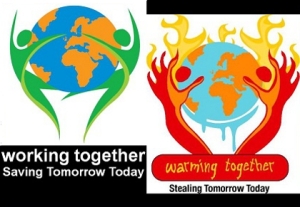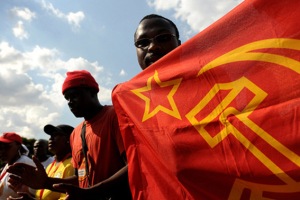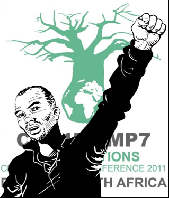This session was organized by groundWork, a South African environmental justice and service organization.
 Mithica, a worker with the Pan-African Climate Justice Alliance, a coalition of African civil society groups working to mobilize communities around climate justice spoke first. The Climate Justice movement cannot succeed, he argued, unless we involve farmers, pastoralists, and others who are impacted by Climate Change. That is why we organized a caravan across Africa.
Mithica, a worker with the Pan-African Climate Justice Alliance, a coalition of African civil society groups working to mobilize communities around climate justice spoke first. The Climate Justice movement cannot succeed, he argued, unless we involve farmers, pastoralists, and others who are impacted by Climate Change. That is why we organized a caravan across Africa.
We know that COP17 will not deliver an agreement responsive to the conditions we in Africa face. But we need to meet with other groups in order to learn how to collaborate successfully.
It takes time for people to realize that solutions proposed by global elites do not work. When we oppose the Clean Development Mechanism, we are often seen as radical. But our campaigns are gaining traction and the movement is growing.
Tom Goldtooth of the Indigenous Environmental Network spoke next. I live in the United States of America, and, yes, it’s true, it is Occupied Territories. I’m indigenous on both sides of my family. We live with all the effects of colonialism, disease from biological warfare – we lost millions and millions of indigenous people – but we’re still here. Our network was born out of the passion of our people to resist toxic dumps and extraction facilities, devastation of our sacred sites, deforestation, violation of treaty rights at the highest level of negotiation between our indigenous tribes as nations with the new colony called the United States.
So we understand colonialism, I feel it everywhere I go. One of the manifestations of colonialism is internalized oppression, where we fight those who should be our sisters and brothers. So how do we find common cause with other environmental activists? We’re not looking for occupying America, we’re looking for Unoccupying America. We’re fighting racism in the US by making common cause with African Americans, Latin@s, Asian Americans, and poor white folks in places like Appalachia.
What we’re seeing in COP17 is a lot of game-playing and hypocrisy. They’re bull shitting – they don’t know what they’re doing.  They’re just playing games – Monopoly, to be specific. It’s about money. Who can get access to the most money. Tomorrow we’re going to be organizing an art brigade to let them know that REDD+ – the WTO of the sky – is not going to work.
They’re just playing games – Monopoly, to be specific. It’s about money. Who can get access to the most money. Tomorrow we’re going to be organizing an art brigade to let them know that REDD+ – the WTO of the sky – is not going to work.
That’s why we’ve embraced the global coalition around the rights of nature. This may not be an indigenous system, but we believe it represents our values. I’m part of a large indigenous movement – and we’re very critical about how we use that term “movement” – standing in solidarity with people in Africa and all over the world.
Asad Rehman of Friends of the Earth-UK was up next, arguing that UNFCCC has to be an integral part of the movement. We need to remember that the job of this organization is to create a global agreement on global greenhouse gas emission reductions. Our job as activists is to act as a front line, reminding the negotiators that what they’re discussing is who has the right to live.
The global elites would love it if we weren’t in the space of the UNFCCC. We know there’s a power imbalance, but our job is to hold governments and elites accountable. So the UNFCCC is a contested space, but it’s not one we can ignore. I think we also have to remember that the UNFCCC is not the WTO – an agreement to reduce greenhouse gas emissions can ONLY take place on a global level. We know that the African countries have the strongest position on climate issues at the UNFCCC, and we need to support them and counter the backdoor agreements that powerful countries work out. Our only chance is to slow down these kinds of agreements, until millions of people are on the street demanding climate justice.
Q: Do our governments have a position to hold the private sector accountable, because they have more and more influence in the UN.
Q: What’s the position of the South African state on social movements, particularly around environmental issues? And what can we learn from other environmental movements?
Q: Can we get some details about the victory in the campaign against the Tar Sands, and thoughts about how we can generalize such victories?
Asad’s answers: The private sector is definitely in the UNFCCC. You only need to walk through the booths to see that. And our national delegations are almost all in hock to the idea of financializing everything, as if that model hadn’t been proven to be totally fucked. And if there’s a global environmental crisis, we won’t be able to bale out the planet the way we can do for the banks. So this is why FoE has many reports about the increasing profile of corporate interests in UNFCCC. We also believe that people need access to decent sources of renewable energy.
Tom’s answers: As indigenous peoples, we’re soon won’t have a choice. Mother Earth is going to force us to confront very real issues of survival. As activists, our work has been framed by the question of how we can build solidarity and information. The most important aspect of this is confronting our mental imprisonment. I’ve seen this around the world during my travels: people are imprisoned and civil society can’t get out of a box. The real question is whether we as civil society organizations can take back these negotiations. At the end of the day, it’s local communities that have to step up. Whenever we step up as indigenous peoples, we get hurt, we get imprisoned. When I was last in Durban, I was here with a leader of a Canadian First Nations group; he released a report about systematic racism. I was with him the day after he released this report when he got a fax telling him to come home because he was an embarrassment; he didn’t go home, but the Canadian government cut funding for his tribe. But we have the power of the upcoming generation, who are more networked than ever.
Where I come from, our indigenous leaders have died in the struggle. We’re taking on the big boys here, and we know it. But the dominant order is in crisis: the carbon market is crashing, and so there’s more and more emphasis on funding these approaches and getting on the gravy train . We need imaginative campaigns now more than ever in response to these trends. For example, we had a cowboy-Indian campaign, going into racist areas of Midwest working to make people aware about conservation strategies.
Q: What can be done now? What will make people remember Durban now?
Q: I’m concerned about inside-outside debates because of the question of time. One hears media reports saying that this is the last chance. If an agreement isn’t reached in Durban, over 100 million people in Africa are going to die. You may be right that, given enough time, we could take UNFCCC back. Isn’t the energy you’re putting into taking back UNFCCC better used in shutting the whole thing down?
Tom’s answer: You gotta be involved on all levels. We’re engaged in nonviolent direct action. People need to get educated and hold their politicians answerable. The negotiations have become a huge maze that no one knows about. The American people have no will to address climate change. But now it’s changing. Tar Sands is part of that.
Asad’s anwer: It is a question of time. And so we need to work on all fronts. US goal for Durban is to lock in “voluntary” pledges of Cancun until 2020. We have to stop this. Emissions have gone up by 6% just over the last year, and that’s in the midst of a global recession. We have got to build collective action for a different world, not just for some agreement about climate change.
Ivonne Yanis of Acción Ecológica presented next. She said that the notion of rights for nature can be a fetish that ignores real problems. Today I also learned about the campaign to leave the oil in the soil, the coal in the hole, the tar sand in the land. But we also need to interrogate terms of these struggles. We moved from energy security to energy sovereignty a few years ago, which is good, but we need to think about what energy is and what sovereignty is. These terms are embedded in a certain history. Finally, we need to keep in mind that unity gives us strength, but, as we say in Spanish, unity comes from celebration. That’s what we’ve been seeing here in Durban – in the spirit of the people who dance and sing in meetings.
Lidy Nacpil, International Coordinator for Jubilee South, talked next about Asian climate issues. What we’re up against in Asia is complex because we have two of the biggest global polluters (China and India) as well as countries like Indonesia and the Philippines that are made up of thousands of islands, half of which we are going to lose no matter what we do moving forward. Africa will burn and these parts of Asia will drown.
Asian social movements derive from the fact that Asia has the largest population of poor people in the world. Our social movements have begun to respond to climate issues over the past few years. We should have mass movements that shut down the COP, but these movements have been totally absent here. We had a demonstration outside COP the other day and only 200 people turned up. We need to do far better.
We’re also internally divided. One section of the movement wants to dissolve the COP, while the other sees it as an arena of struggle. We need to be able to find a synergy between these movements or else we’re unlikely to have the impact we want. Most of our movements take the stance that COP is an important arena to engage in. We see it as a place to demand what the governments must do. We don’t decide to struggle only when we think we’ll win. We struggle despite the fact that the odds are stacked against us. Even if we want to overthrow our governments, we need to push them to do something while they’re in power.
In addition, it’s through struggle and fights that we sharpen our analysis and we hone our tactics. So one arena is the COP. Also, there’s a practical effect because of what happens in COP – we must fight against the destruction of the planet that COP is pushing. We can’t just sit back denouncing while they kill us even more.
We’re convinced that the climate struggle must be part of a broader transformation of the system. But we cannot wait for the transformation of the system before we do something. We don’t know if we’re going to succeed in our struggle for socialism, but in the meantime our people are starving – we need to do something now. We cannot wait until a new world is born – we have to act now to bring it to birth.
Q: Why aren’t we on the streets? Don’t we need to move from discussion to action?
Q: While we’re here in South Africa, we should ask ourselves how we can build up the people and their specific struggles while we’re here.
Lidy: Yes, we want to contribute to local struggles, but we’re also here because we want to send a clear message to the big polluters that we have specific demands for cuts in pollution. We have to spend more time in the streets of Durban than in university lecture halls. It’s so strange that this negotiation is going on and there’s not a strong climate justice movement on the streets.
OK – from tomorrow we’re canceling all side events. All side events will take place in the streets.
The conclusion to this panel, as positive as it is, underlines to me what huge obstacles we face as a movement. A meeting of COP in African should have been an opportunity for massive mobilization and real expression of the righteous anger of the peoples of this most threatened of all continents. It should have been an opportunity to shut the COP down, as activists managed to do for the WTO meetings in Seattle a decade ago. Instead, though, we see tiny numbers of activists on the streets and a perfectly correographed party for global policy elites. This is a huge missed opportunity – the next COP is going to be in Qatar, where no dissent and protest will be possible.
But perhaps it’s unfair to expect a massive mobilization in an African nation, even one as developed as South Africa. This country is so unevenly developed. I’ve never seen such a high percentage of BMWs and Mercedes on the roads – not even in Germany – as on the trip in to Durban from the airport. The whites of South Africa are incredibly affluent and complacent, it seems to me as an external observer. And I just don’t see the kind of mass mobilization on the ground here of the overwhelmingly black and poor populace that would be necessary to make a dent in global elites. Perhaps people just don’t have the time, not to mention the education, to mobilize around this issue here in South Africa, and in Africa in general.
Perhaps folks can mobilize around specific struggles here, but not around a general set of issues united under the banner of Climate Justice. I’m thinking in particular of Rob Nixon’s argument in Slow Violence about the difficulty of perceiving and organizing against environmental degradation. Maybe I’m being too gloomy here. The coming days will tell.
 It’s pouring down rain with a tropical vengeance at the moment after several days of clear skies and fierce heat.
It’s pouring down rain with a tropical vengeance at the moment after several days of clear skies and fierce heat.


